Highlights:
- An exhilarating 6,165-meter climb in the Khumbu region of Nepal
- Hike to Everest Base Camp and Kala Patthar
- Spend nights in beautiful Sherpa villages and see their lives closely
- Enjoy trekking via different climatic zones ranging from rhododendron forests to glacier moraines
- Take thrilling flights in and out of Lukla
- Hone your climbing skills and introduce you to the mountaineering world
- Push yourself and get out of your comfort zone
- Build your strength, endurance, and confidence
- Witness jaw-dropping landscapes and stunning mountain vistas
- Get to see many lovely sunrises and sunsets
Overview
Island Peak offers an exhilarating 6,165-meter climb in the Khumbu region of Nepal. It is located close to Mount Everest, the tallest mountain in the world. The peak has a non-technical climbing route, so it is ideal for beginner climbers.
The journey is life-changing and presents adventure, wilderness, traditional mountain lifestyle, and breathtaking landscapes. On the Island Peak climbing trip, you will enjoy trekking and climbing.
The first few days of the voyage are spent trekking through rhododendron forests and Sherpa villages in the Sagarmatha National Park. You will ascend to Everest Base Camp and Kala Patthar, which will help you acclimate and avoid altitude sickness.
The journey then turns towards climbing. Following a less crowded, offbeat route, hike to Chhukung village and climb Island Peak Base Camp. The Island Peak rises from the Lhotse glacier at the southern end, offering an incredible summit experience.
You will climb to the Lhotse glacier snout from the base camp and cross a 60-70-degree headwall about 150 meters tall to reach the Island Peak summit.
The whole Island Peak climbing 21 days trip will present you with stunning mountain vistas of Thamserku, Everest, Lhotse, Ama Dabla, Nuptse, Cho Oyu, Makalu, Kanchenjunga, Cholatse, Baruntse, and many others. The landscape changes with the elevation change, ranging from lush forests and verdant hills to glacier moraines and barren hills.
Whether this is your first time climbing a peak or not, Island Peak climbing offers the best mountaineering experience. You will hone your climbing skills and become part of one of the most supportive communities around the world!
Are you fit for Island Peak climbing?
Your physical and mental fitness reflects the Island Peak climbing difficulty. We do not need previous climbing experience from our participants, but they need to have trekking experience.
We highly recommend treks like Everest Three Passes, Annapurna Circuit, Manaslu Circuit, Kanchenjunga Circuit, etc. If you have completed these treks, you are ready to climb Island Peak. Likewise, if you are an athlete or have strong strength and endurance, you may consider climbing Island Peak.
Island Peak climbing presents a fantastic introduction to peak climbing in Nepal. It is a trekking peak, so no need to worry about technical difficulties.
If you plan to climb a 7000m or 8000m mountain in Nepal, then Island Peak has a practice peak to improve your climbing skills, endurance, and confidence.
If you are a regular individual who wants to feel a huge sense of achievement and experience reaching the top of a summit in the Himalayas, you can also do Island Peak climbing.
There is no age bar to climb this peak. However, climbers below 18 years old must be accompanied by their parents or an identified guardian.
What can you expect during the Island Peak climbing in Nepal?
- We, Trekking Guide Team Adventure, offer full support during the Island Peak climbing expedition. From Sherpa guides to porters, transportation, permits, accommodation, food, and taxes, we will take care of all the logistics involved in the journey.
- Climbing Island Peak will change your life. Whatever your reason behind climbing this peak, it will get you out of your comfort box and push your limits.
- Enjoy the lushness, vegetation, and different climates of Sagarmatha National Park. Cross many thrilling suspension bridges and walk on steep uphill and downhill tracks.
- Explore picturesque Sherpa villages like Phakding, Namche Bazaar, Tengboche, Dingboche, Lobuche, Chhukung, and many others. See the daily lives of the locals and get to know the Sherpa community closely.
- Visit ancient monasteries like Tengboche and Pangboche.
- Take two acclimatization breaks in Namche Bazaar and Dingboche and hike to the Hotel Everest View and Nagarjuna Hill.
- Walk along the Khumbu Glacier moraines, pass by memorial chortens, explore the Everest Base Camp, enjoy a close view of Khumbu Icefall, and witness a gorgeous sunrise from Kala Patthar.
- Amidst the adventure, take a moment to enjoy the tranquility of nature, the vast wilderness, and the bliss of solitude. This journey is not just about pushing your limits, but also about finding peace and serenity amid the Himalayas.
- Get pre-climbing training at the Island Peak Base Camp. Learn to use climbing gear and other important skills.
How do you prepare for Island Peak climbing with Everest Base Camp?
To prepare for Island Peak climbing with Everest Base Camp trek, you have to be super disciplined. Regular exercises are needed to improve your stamina, strength, and endurance. Long walks, hiking, trekking, running, cycling, swimming, etc, are some activities that you should do at least 5 times a week.
If you have access to a gym, go for strength training. Some places offer specific training for mountaineers, and you can enroll in that, too. You do not have to learn how to climb, but mountain awareness will be very helpful. Just focus on getting into better shape.
Island Peak climbing difficulty and altitude sickness
If you want to climb Island Peak, you have to be physically and mentally strong. It is one of the less technically challenging peaks in Nepal, which makes it ideal for first-time climbers.
However, the journey to reach the summit and return is very physically and mentally demanding. You have to deal with low oxygen levels, thin air, high altitude, exposure to cold, wind, and sun, and strenuous climbing.
It doesn't matter how fit you are; you have to push yourself. So, your strength, stamina, determination, and endurance must be in great condition. Likewise, you also have to deal with altitude sickness during Island Peak climbing. It happens when your body is not acclimatized, and you keep gaining elevation.
We have added two acclimation days to our Island Peak climbing itinerary and a good number of climbing high and sleeping low days. By the time you begin climbing, you will acclimate to the altitude. If you see any symptoms of altitude sickness, our guide will take care of them.
Below are some tips to make Island Peak climbing less challenging and increase your success rate:
- Make sure you are ready for the journey physically, mentally, and emotionally. We have already discussed this expedition's physical and mental demands but have not talked about emotional demands. Climbing a peak is a huge emotional experience. You will feel excited, nervous, overwhelmed, happy, scared, and whatnot. It is important that you stay calm. So, practice mindfulness and breathing techniques.
- Himalayas demand patience. The moment you start to rush, the trip will begin to fall. Take your time to enjoy nature and your surroundings. Ascend slowly and listen to your body. It is an adventure trip, so ample rest is also needed. Eat nutritious food and keep yourself hydrated. You have to be in your best form to climb a mountain.
- Do not have any medicine without your guide's knowledge. He is responsible for your well-being in the mountains. He has to know what you are having in case any medical emergency arises, and he has to brief the medical experts on what you have. Plus, our guides are trained to provide first aid and have many years of experience handling health-related issues during climbing.
- Stretch your body every day after the trek ends. It will help you relieve sore muscles.
- Pack ORS for instant energy and a hydration boost during the expedition.
Why climb Island Peak with Trekking Guide Team Adventure?
Our company offers the best Island Peak climbing with EBC trek service. With more than 20 years of expertise in organizing Island Peak climbing, we assure you of a safe expedition. Our guides have climbed this peak several times and offer substantial support.
We also have the most genuine Island Peak climbing cost in the market. Likewise, our cost and policy are transparent. Your money is safe with us. If you decide to cancel the trip, we have a great refund policy that you can check here in detail.
Similarly, we have many additional perks, such as airport pick-up and drop-off, a duffel bag to use during the journey, a friendly crew to help you throughout the excursion, supplement oxygen cylinders, an oximeter, satellite phone, etc. You will be well-equipped for climbing.
Overall, you do not have to worry about anything while climbing with us. Island Peak climbing 2026 and 2027 bookings are open. If you have any questions or want to tailor the trip, contact us.

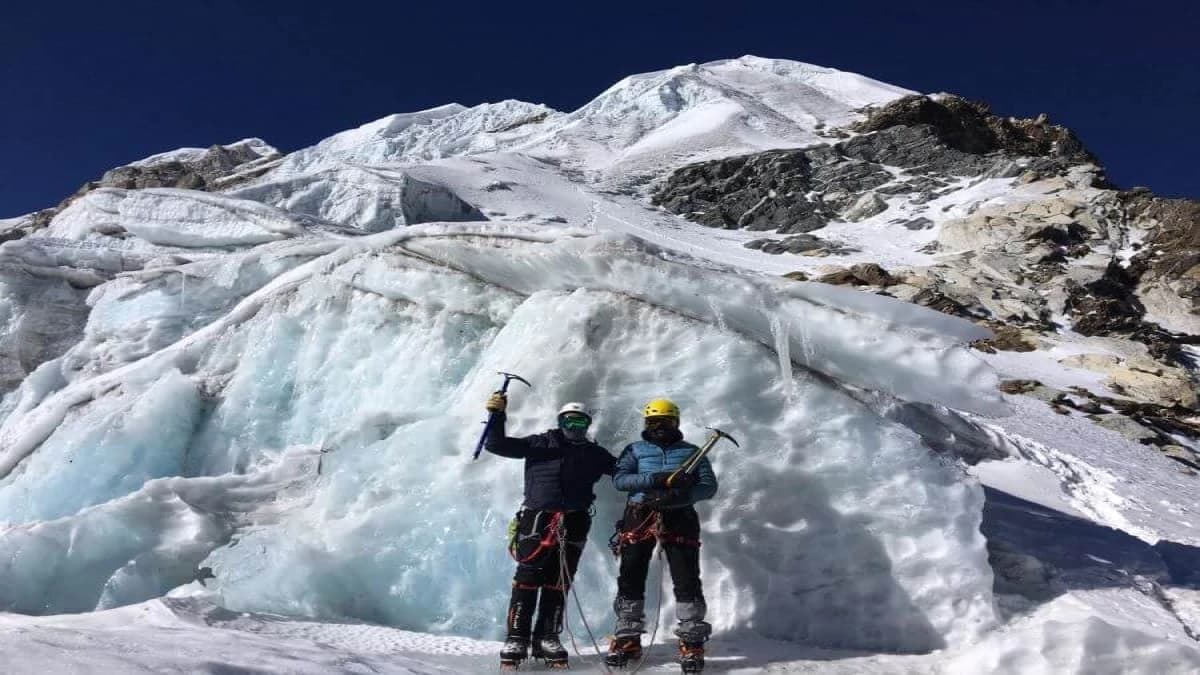
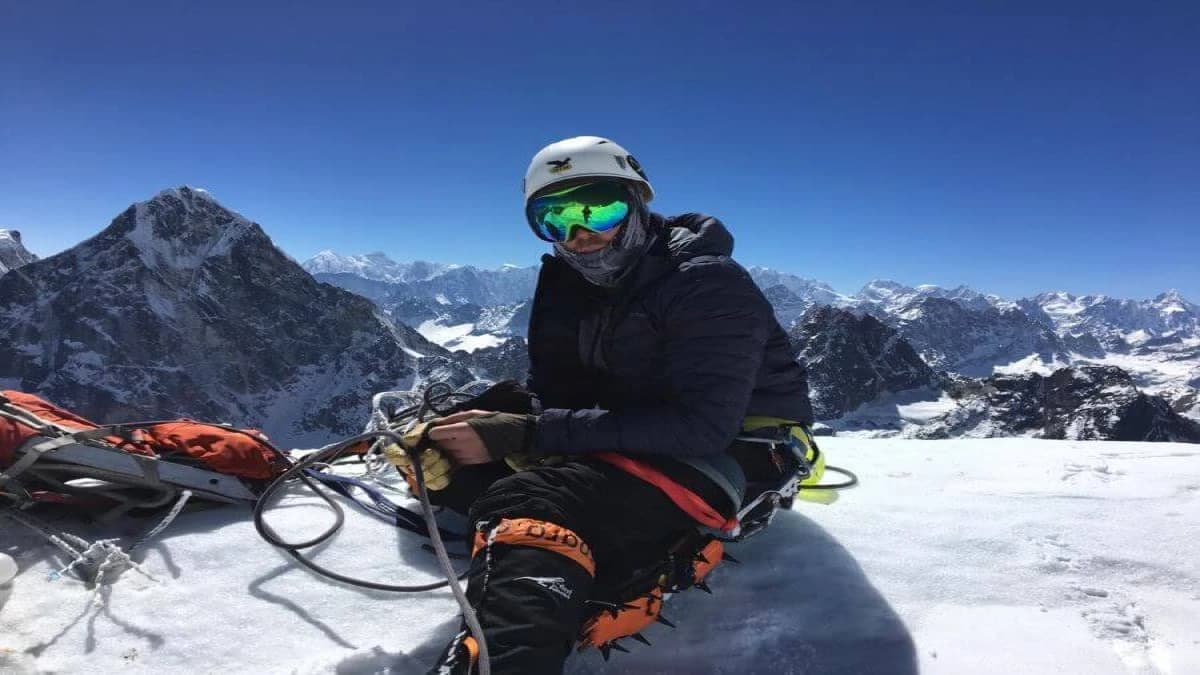
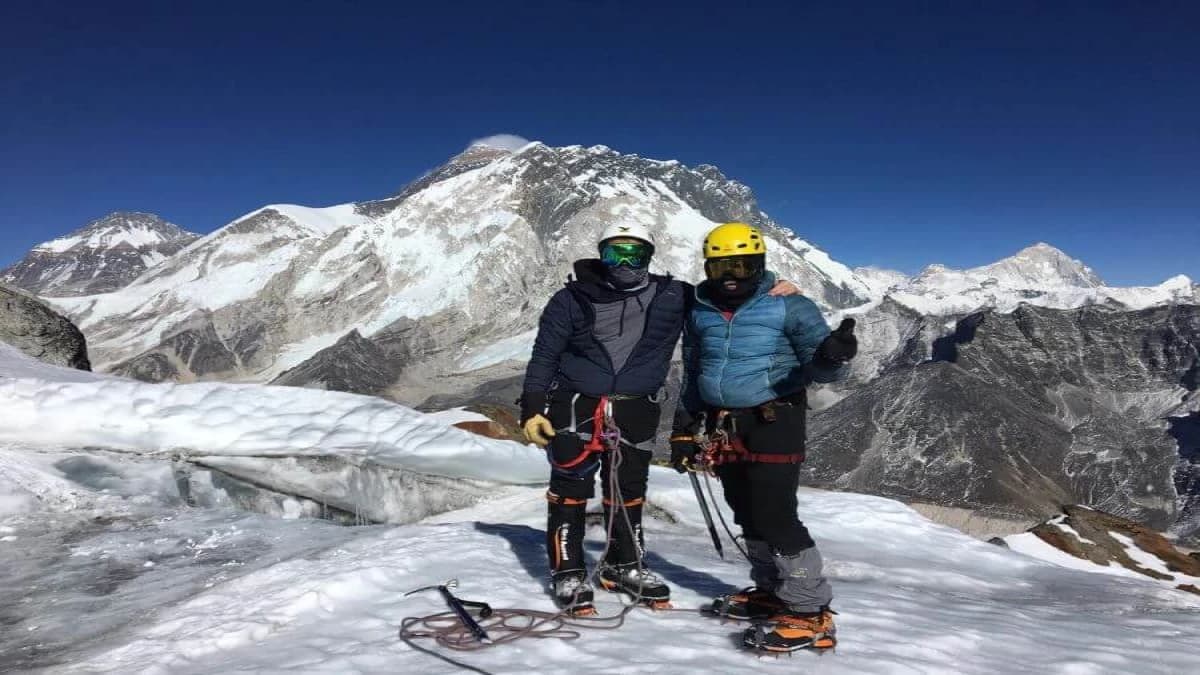
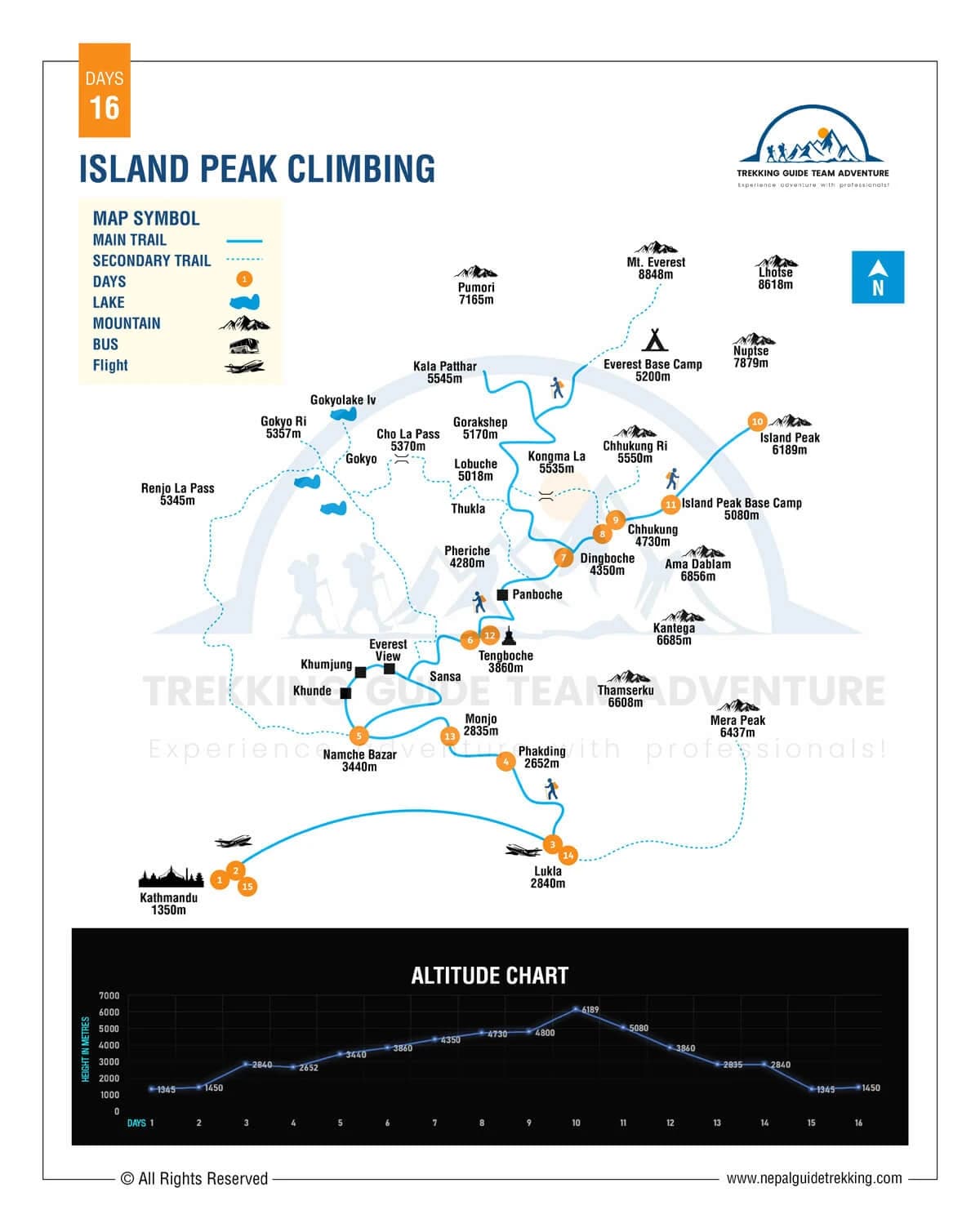

















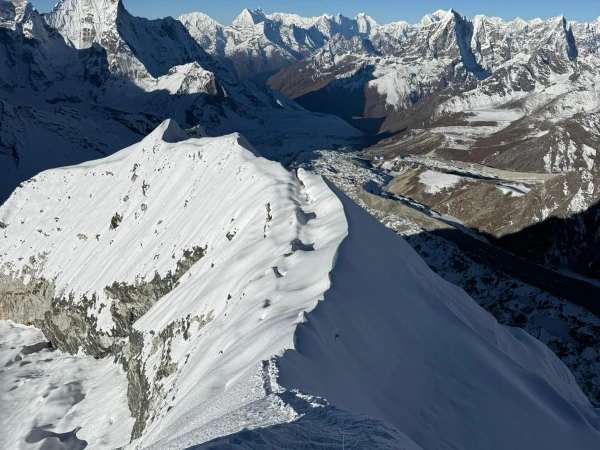

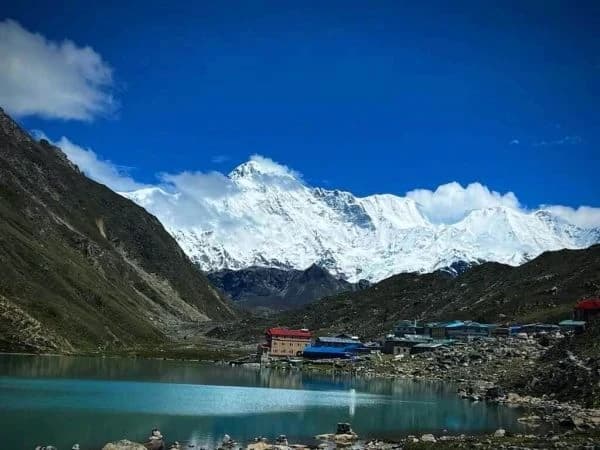
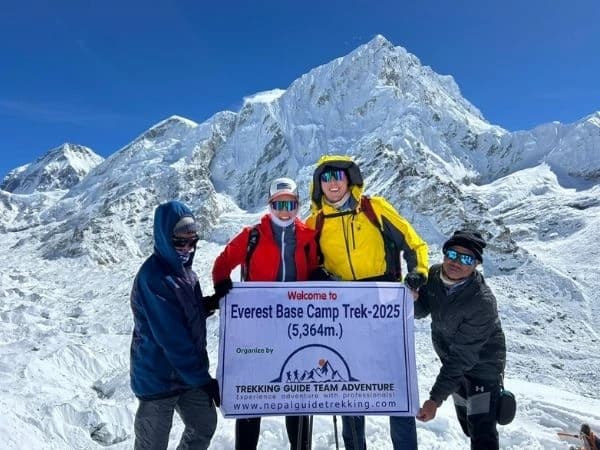
.webp&w=1200&q=75&dpl=dpl_68Rv4Pgy4zvXB9MpKN384tKuFytD)